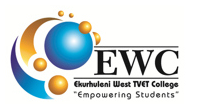To obtain a National Certificate: A total of 7 subjects: 3 Fundamental and 4 Vocational subjects, of which 3 are compulsory and 1 is optional.

Admission requirements:
Grade 9 or higher
ABET Level 4
NQF Level 1
To obtain a National Certificate: A total of 7 subjects: 3 Fundamental and 4 Vocational subjects, of which 3 are compulsory and 1 is optional.
Subjects:
Compulsory Fundamental Subjects
English first: Additional Language
Mathematical Literacy
Life Orientation
Vocational Subjects
Applied Accounting
Economic Environment
Financial Management
Entrepreneurship
Access to the following vocational activities:
Will be able to:
Perform bookkeeping duties;
Keep records of wages, salaries, petty cash, VAT and reconciliations;
Prepare financial statements;
Manage budgets;
Analyse finances of the business, etc.
Career Opportunities:
Private and Public Accounting; Banking; Financial Services; Insurance Services; Investing; Broking; Bookkeeping.
Ekurhuleni West Technical, Vocational, Education and Training College (EWC) is a public institution regulated by the FET Colleges Act no 16 of 2006, as amended.
It was established in terms of the Further Education and Training Act, Act No .98 of 1998, declared as such by the Member of the Executive Council (MEC) for Education (Gauteng Province) in terms of a Provincial Gazette Extraordinary (dated 7 December 2001).
Ekurhuleni West TVET College is situated in the Ekurhuleni Metropolitan Municipality in Gauteng Province in South Africa. EWC operates within a broad band and diverse communities and comprises of the following six (6) campuses: Alberton, Boksburg, Germiston, Kathorus, (in Katlehong/ Vosloorus/ Thokoza), Kempton (in Kempton Park) and Tembisa.
© 2025 coursetakers.com All Rights Reserved. Terms and Conditions of use | Privacy Policy